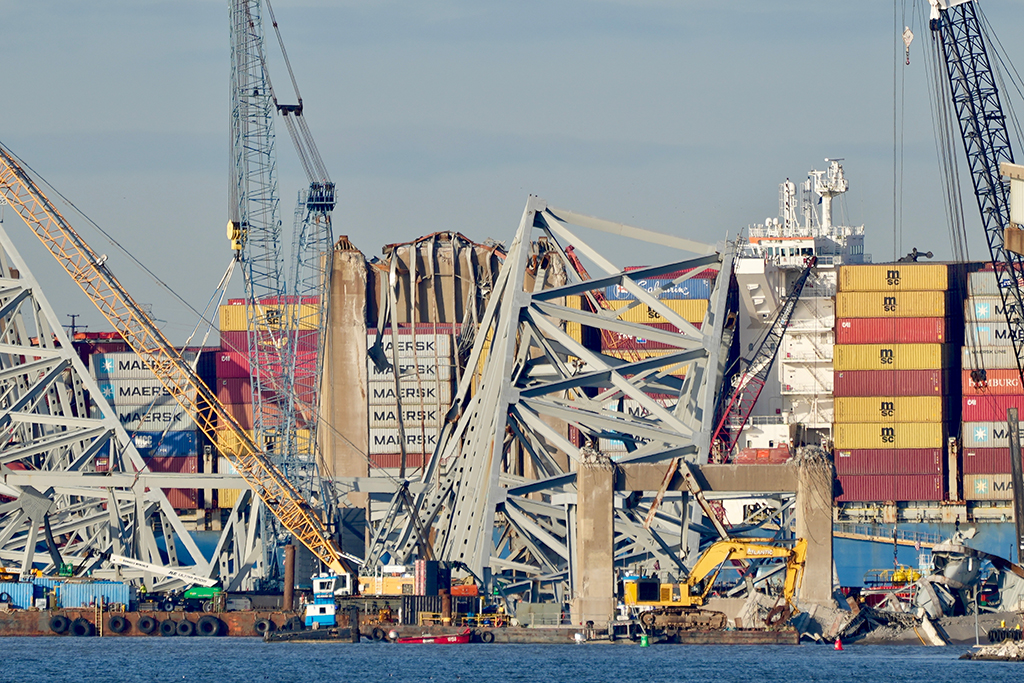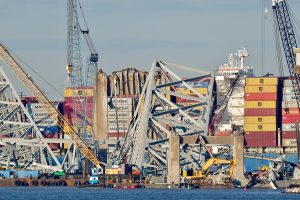BALTIMORE – As a sprawling liability case takes shape following the deadly collapse of Baltimore’s Francis Scott Key Bridge in March, the owner and manager of the container ship Dali are seeking to deflect responsibility and cast blame elsewhere.
Attorneys for Singapore-based Grace Ocean Private Limited and Synergy Marine Group argued in court Tuesday that Maryland state officials should have better protected the bridge against ship strikes. They also raised questions about whether the shipbuilder installed faulty electrical equipment that caused the Dali to lose power as it approached the bridge.
Meanwhile, lawyers for dozens of claimants seeking damages argued that the immediate focus should remain on where the two companies dropped the ball.
“It’s not an offensive tool,” said attorney David Reisman, who represents the state of Maryland. He argued the court shouldn’t consider such allegations from the companies this early in the litigation process.
Among the claimants are the families of six construction workers killed in the collapse as well as state and local governments, businesses, longshoremen and more. They’ve accused Grace Ocean and Synergy of failing to properly maintain the Dali, ignoring longstanding problems with its electrical system and knowingly sending an unseaworthy vessel into Maryland waters.
Shortly after the March 26 collapse, the companies filed a petition in federal court in Baltimore seeking to limit their liability. Since then, nearly 50 other entities have filed opposing claims in the case.
At a scheduling conference Tuesday, Judge James Bredar questioned attorneys on both sides in an effort to “bring structure to this sprawling and unusual matter,” which could become the most expensive marine casualty case in history.
Bredar said the ultimate goal is delivering the case “to the launching pad for settlement.” But that could take years. He said a forthcoming order will address the first phase of the case, including a timeline and a determination of the appropriate scope — whether it’s narrowly focused or considers broader questions like third-party liability.
William Bennett, an attorney for Grace Ocean, argued the court should consider assigning “significant liability and fault” to state officials, among others. He cited “decades of records” showing the state of Maryland failed to properly protect the bridge, which was built in the 1970s with minimal pier protection.
The courtroom’s gallery was filled with attorneys involved in the case. The discovery process will likely include dozens of hours long depositions over the next several months, culminating in a bench trial.
It’s possible some of the federal claims could be settled in the meantime. Just last week, Grace Ocean and Synergy agreed to pay more than $102 million in cleanup costs to settle a claim brought by the U.S. Department of Justice. That payment will reimburse the federal government for money spent clearing massive amounts of debris from the Port of Baltimore’s main shipping channel, which remained closed for months after the collapse.
After announcing the settlement, a spokesperson for Grace Ocean said it wasn’t an admission of responsibility or wrongdoing.
The Justice Department claim, which has since been dismissed, provided the most detailed account yet of the cascading series of failures that left the Dali’s pilots and crew helpless in the face of looming disaster. The complaint pointed to “excessive vibrations” on the ship that attorneys called a “well-known cause of transformer and electrical failure.” Instead of dealing with the source of the vibrations, crew members “jury-rigged” the ship, the complaint alleged.
FBI agents boarded the ship in April amid a criminal investigation into the circumstances leading up to the collapse.
The Dali was leaving Baltimore enroute to Sri Lanka when it lost power and veered off course, striking the bridge. Six members of a roadwork crew plunged to their deaths. A last-minute mayday call from the ship’s pilots allowed police to stop traffic to the bridge, but they weren’t able to alert the workers.
The collapse snarled commercial shipping traffic through the Port of Baltimore, increased commute times for local drivers and left many longshoremen temporarily out of work. Trucking businesses and other companies that relied on the bridge are anticipating long-term impacts, according to court filings.
The federal case will likely be followed by additional lawsuits in Maryland state courts.
©2024 THE ASSOCIATED PRESS




Recent Comments
comments for this post are closed